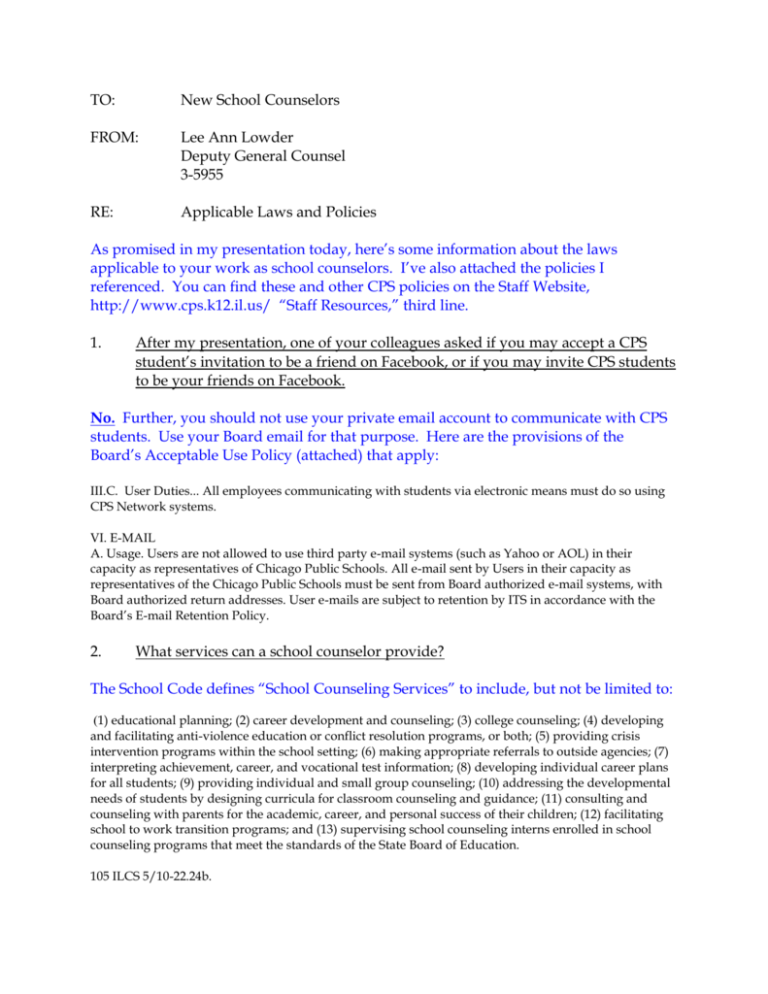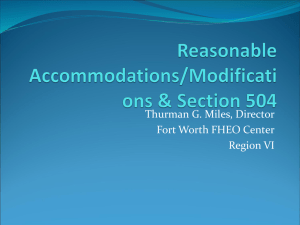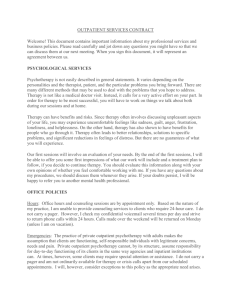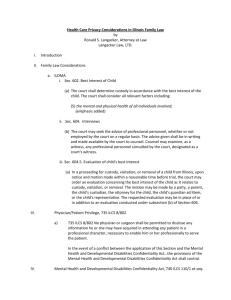TO: New School Counselors FROM: Lee Ann Lowder Deputy
advertisement

TO: New School Counselors FROM: Lee Ann Lowder Deputy General Counsel 3-5955 RE: Applicable Laws and Policies As promised in my presentation today, here’s some information about the laws applicable to your work as school counselors. I’ve also attached the policies I referenced. You can find these and other CPS policies on the Staff Website, http://www.cps.k12.il.us/ “Staff Resources,” third line. 1. After my presentation, one of your colleagues asked if you may accept a CPS student’s invitation to be a friend on Facebook, or if you may invite CPS students to be your friends on Facebook. No. Further, you should not use your private email account to communicate with CPS students. Use your Board email for that purpose. Here are the provisions of the Board’s Acceptable Use Policy (attached) that apply: III.C. User Duties... All employees communicating with students via electronic means must do so using CPS Network systems. VI. E-MAIL A. Usage. Users are not allowed to use third party e-mail systems (such as Yahoo or AOL) in their capacity as representatives of Chicago Public Schools. All e-mail sent by Users in their capacity as representatives of the Chicago Public Schools must be sent from Board authorized e-mail systems, with Board authorized return addresses. User e-mails are subject to retention by ITS in accordance with the Board’s E-mail Retention Policy. 2. What services can a school counselor provide? The School Code defines “School Counseling Services” to include, but not be limited to: (1) educational planning; (2) career development and counseling; (3) college counseling; (4) developing and facilitating anti-violence education or conflict resolution programs, or both; (5) providing crisis intervention programs within the school setting; (6) making appropriate referrals to outside agencies; (7) interpreting achievement, career, and vocational test information; (8) developing individual career plans for all students; (9) providing individual and small group counseling; (10) addressing the developmental needs of students by designing curricula for classroom counseling and guidance; (11) consulting and counseling with parents for the academic, career, and personal success of their children; (12) facilitating school to work transition programs; and (13) supervising school counseling interns enrolled in school counseling programs that meet the standards of the State Board of Education. 105 ILCS 5/10-22.24b. 3. Do I need parental consent to provide these services? No, not unless you are providing group counseling to students as part of an Individualized Education Plan. The School Code section on School Counseling Services (see #1) does not require parental consent. The School Code’s definition of “School Social Work Services,” by contrast, requires parental consent for group counseling for students with disabilities: (4) Counseling with students, parents, and teacher in accordance with the rules and regulations governing provision of related services, provided that parent permission must be obtained in writing before a student participates in a group counseling session 105 ILCS 5/14-1.09.2(4) (emphasis added). (Valerie, here are the other duties a school social worker can perform: School Social Work Services. In the public schools, social work services may be provided by qualified specialists who hold Type 73 School Service Personnel Certificates endorsed for school social work issued by the State Teacher Certification Board. School social work services may include, but are not limited to: (1) Identifying students in need of special education services by conducting a social-developmental study in a case study evaluation; (2) Developing and implementing comprehensive interventions with students, parents, and teachers that will enhance student adjustment to, and performance in, the school setting; (3) Consulting and collaborating with teachers and other school personnel regarding behavior management and intervention plans and inclusion in support of special education students in regular classroom settings; (4) Counseling with students, parents, and teachers in accordance with the rules and regulations governing provision of related services, provided that parent permission must be obtained in writing before a student participates in a group counseling session; (5) Acting as a liaison between the public schools and community resources; (6) Developing and implementing school-based prevention programs including mediation and violence prevention; (7) Providing crisis intervention within the school setting; (8) Supervising school social work interns enrolled in school social work programs that meet the standards established by the State Board of Education; (9) Providing parent education and counseling as appropriate in relation to the child's educational assessment; and (10) Assisting in completing a functional behavioral assessment, as well as assisting in the development of nonaversive behavioral intervention strategies. Nothing in this Section prohibits other certified professionals from providing any of the services listed in this Section for which they are appropriately trained.) 4. Am I limited to providing five 45-minutes counseling sessions, unless I have parental consent? No. That provision of the Mental Health and Developmental Disabilities Act does not apply to mental health professionals in schools. The MHDDA provides that children 12 and older may receive five counseling services in a mental health facility without parental notification. 405 ILCS 5/3-501(a). A “mental health facility” is defined as “any facility. . . operated by the State or a political subdivision thereof for the treatment of persons with mental illness. . . .” 405 ILCS 5/1-114 (emphasis added). Schools are not facilities for the treatment of persons with mental illnesses. 5. Is the information a student tells me confidential? Yes, but keep reading. You may still be obligated or have discretion to disclose it. Under the Mental Health and Developmental Disabilities Confidentiality Act, “confidential communication means “any communication made by a recipient or other person to a therapist or to or in the presence of other persons during or in connection with providing mental health or developmental disability services to a recipient. 740 ILCS 110/2. 6. Am I a “therapist” under the MHDDCA? Yes. That act defines a “therapist” as a “psychologist, social worker, or nurse providing mental health or developmental disabilities services or any other person not prohibited by law from providing such services or from holding himself out as a therapist if the recipient reasonably believes that such person is permitted to do so.” 740 ILS 110/5. School counselors are permitted by law to provide counseling services. See #1 above. 7. If I believe a student is a danger to him/herself or others, may I disclose that information? Yes. It is within your sole discretion to decide whether you believe disclosure is necessary to protect the student or someone else from a clear, imminent risk of harm. Under the MHDDCA, records and communications may be disclosed “when, and to the extent, a therapist, in his or her sole discretion determines that disclosure is necessary to . . . protect the recipient or other person against a clear, imminent risk of serious physical or mental injury or disease or death being inflicted upon the recipient or by the recipient on himself or another.” 740 ILSC 110/11(ii). The law presumes that the therapist who makes such a disclosure is acting in good faith. Id. 8. Can a parent/guardian require me to disclose records about mental health and developmental disabilities services I provide to a student? First, you never have to disclose your “personal notes,” if you keep them in your sole possession. “Personal notes” means: (i) information disclosed to the therapist in confidence by other persons on condition that such information would never be disclosed to the recipient or other persons; (ii) information disclosed to the therapist by the recipient which would be injurious to the recipient's relationships to other persons, and (iii) the therapist's speculations, impressions, hunches, and reminders. 740 ILCS 110/2. If the student is under 12, you must disclose your records (not personal notes), if the parent requests them: “Record” means any record kept by a therapist or by an agency in the course of providing mental health or developmental disabilities service to a recipient concerning the recipient and the services provided.... Record does not include the therapist's personal notes, if such notes are kept in the therapist's sole possession for his own personal use and are not disclosed to any other person, except the therapist's supervisor, consulting therapist or attorney. If at any time such notes are disclosed, they shall be considered part of the recipient's record for purposes of this Act. Id. If the student is 12-17, you must disclose his/her records to his/her parent/guardian, if: 1. the student is informed and does not object, 2. you do not find a compelling reason to deny access, or 3. a court orders disclosure. The following persons shall be entitled, upon request, to inspect and copy a recipient's record or any part thereof: (1) the parent or guardian of a recipient who is under 12 years of age; (2) the recipient if he is 12 years of age or older; (3) the parent or guardian of a recipient who is at least 12 but under 18 years, if the recipient is informed and does not object or if the therapist does not find that there are compelling reasons for denying the access. The parent or guardian who is denied access by either the recipient or the therapist may petition a court for access to the record. Nothing in this paragraph is intended to prohibit the parent or guardian of a recipient who is at least 12 but under 18 years from requesting and receiving the following information: current physical and mental condition, diagnosis, treatment needs, services provided, and services needed, including medication, if any; . . . 740 ILCS 110/4. 9. Under what circumstances might a parent or student successfully sue me? You are not liable for injuries: • caused by failure to make an adequate mental examination to determine if a student is a danger to him/herself or others • resulting from diagnosing or failing to diagnose mental illness or addiction. You may be liable if a student is injured: • due to your conduct, which was intentional or done with conscious disregard or indifference to the student’s safety • you knew or should have known that your conduct posed a high probability of serious physical harm to the student. This is a lot of information. If you have any questions about your legal obligations, please don’t hesitate to call me!






